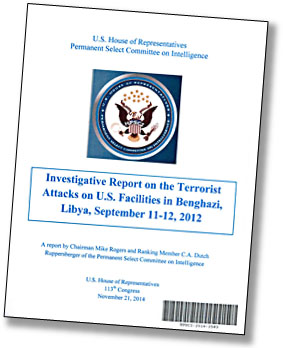After two years of seemingly endless Benghazi coverage, how did the nation’s major media cover the report of a Republican-led House committee that debunked every single Benghazi conspiracy theory and absolved the White  House of wrongdoing? Long story short, don’t bother looking on the front page anywhere. Here’s a rundown:
House of wrongdoing? Long story short, don’t bother looking on the front page anywhere. Here’s a rundown:
- The Washington Post briefly moved its story into the top spot on its homepage this afternoon. In the print edition, it ran inside on page A12.
- The New York Times ran only a brief AP dispatch yesterday. Late today they finally put up a staff-written story, scheduled to run in the print edition tomorrow on page A23.
- The Wall Street Journal ran a decent piece, but it got no play on the website and ran in the print edition on page A5.
- USA Today ran an AP dispatch, but only if you can manage to find it. I don’t know if it also ran anywhere in the print edition.
- As near as I can tell, the LA Times ignored the story completely.
- Ditto for the US edition of the Guardian.
- Fox News ran a hilarious story that ignored nearly every finding of the report and managed to all but say that it was actually a stinging rebuke to the Obama administration. You really have to read it to believe it.
I get that the report of a House committee isn’t the most exciting news in the world. It’s dry, it has no visuals, it rehashes old ground, and it doesn’t feature Kim Kardashian’s butt.
Still, this is a report endorsed by top Republicans that basically rebuts practically every Republican bit of hysteria over Benghazi spanning the past two years. Is it really good news judgment for editors to treat this the same way they would a dull study on the aging of America from the Brookings Institution?
UPDATE: Late tonight, the LA Times finally roused itself to run a non-bylined piece somewhere in the Africa section. MORNING UPDATE: Actually, it turned out to be just a condensed version of the AP dispatch. It ran on page A7.
I should add that the stories which did run were mostly fairly decent (Fox News excepted, of course). In particular, Ken Dilanian’s AP report was detailed and accurate, and ran early in the morning. The problem is less with the details of the coverage, than with the fact that the coverage was either buried or nonexistent practically everywhere.

















